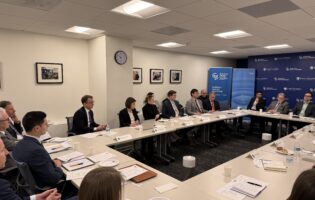French Elections and the Impact on Germany, the U.S., and the European Union
On Wednesday, May 3, 2012, the American-German Institute (AGI) hosted a discussion with Reinhard Bütikofer, a German Member of the European Parliament, and Nicolas Véron, a French economist currently serving as a Visiting Fellow at the Peterson Institute for International Economics, moderated by Alexander Privitera, AGI Senior Fellow. In their discussion, Mr. Bütikofer and Mr. Véron operated under the likely assumption that Socialist party candidate, Francois Hollande, will oust incumbent candidate, Nicolas Sarkozy, from office as they discussed potential international implications of presidential run-off elections in France on Sunday, May 5.
The speakers discussed the implications of the French election with regard to Franco-German diplomacy. Mr. Bütikofer expressed doubt that Hollande’s ascension to the French presidency would pose a substantial threat to the strength of the Franco-German relationship. Mr. Véron echoed this sentiment, but also postulated that the tenor of EU politics may develop in complexity with the election of a Socialist in France. Without a conservative counterpart in France, Chancellor Angela Merkel may attempt to engage these leaders more actively in charting the course for the European Union. The experts explored the possibility of expanding the EU conversation to include leaders such as Italian Prime Minister Mario Monti and British Prime Minister David Cameron.
With mention of the European Union, the roundtable discussion quickly shifted its focus to economic implications of the anticipated election of Hollande. Thus far, the fiscal pact for euro zone nations has placed high emphasis on austerity, but Hollande strongly favors growth and investment measures in economic recovery policies. Although Hollande appears to oppose the strong emphasis on austerity in addressing the European financial crisis, both experts regarded his proposed changes to the European fiscal pact as very modest. Mr. Bütikofer offered that a France led by Hollande would rebalance rather than reverse the EU’s approach to addressing the European economic crisis, and possibly aid in bridging the widening cleavages between northern and southern Europe. In considering diplomacy outside of Europe, Mr. Véron cited the historic tendency of French Socialists to rule as Atlanticists and expressed expectations of continually strong relations between the United States and France.
One area of controversy emerged as the panelists discussed the possibility of creating euro bonds and further EU fiscal integration. Chancellor Merkel voices disfavor toward the creation of euro bonds, but many within the EU, including Hollande, would support such measures. Mr. Bütikofer emphasized that Chancellor Merkel may refuse to negotiate the possibility of euro bonds in order to maintain her conservative base in Germany.
Nevertheless, expectations of Hollande’s leadership remain highly speculative, as the politician has not yet held an executive political office. Due to this, Mr. Bütikofer and Mr. Véron postulated that a Hollande presidency would include a period of initial political blunders as the Socialist charts a course for office. The potential for further economic downturn in France may eventually necessitate substantial domestic structural reforms that may face domestic opposition. Regardless of the outcome of Sunday’s run-off election, the coming five years will pose considerable challenges to the president of France.
Reinhard Bütikofer is the current speaker of the German Green Party in the European Parliament and a Member of the Delegation for Relations with the United States. He is also a Vice President and Treasurer of his political group, The Greens/European Free Alliance, and speaker of the German Green Party’s delegation to the European Parliament. From 2002 until 2008, Mr. Bütikofer was the national party chairman of the German Green Party and served as Secretary General from 1998 until 2002.
Nicolas Véron is a Fellow at the Peterson Institute for International Economics and a Senior Fellow at Bruegel, a Brussels-based economic policy think tank. His research focuses on financial systems and financial regulation. His publications also include Smoke & Mirrors, Inc.: Accounting for Capitalism (2006), and several books in French. His experience expands from the French government to the private sector.







